Photographs: Rajesh Karkera/Rediff.com Archana Masih in Shillong
'Human society is a conflict-prone society...'
'You cannot have complete peace of the graveyard...'
'Switzerland had 500 years of peace and what did they produce? The Cuckoo Clock...'
'Italy had always been in turmoil and they produced Michelangelo, Leonardo da Vinci and the Renaissance.'
Meghalaya Governor Ranjit Shekhar Mooshahary, a former head of the Border Security Force and the National Security Guard, in a rare and candid interview with Rediff.com's Archana Masih.
The beautiful, recently restored, governor's house in Shillong, Meghalaya, could easily be one of the most charming official residences in India.
Four decades after it gained statehood, the first governor of North-eastern origin to live in the century-old building is Ranjit Shekhar Mooshahary. Prior to him, all incumbents have been politicians from India's mainland.
A retired Indian Police Service officer, Mooshahary served as Director General of Police, Kerala; he also headed the Border Security Force and the National Security Guard.
From the Bodo tribe from Assam, he overcame many hurdles due to immense poverty, attended night college while doing petty jobs to support his family and went on to become the first Bodo IPS officer from his state.
In his office at the Raj Bhavan in Shillong, he spoke to Rediff.com's Archana Masih about the withdrawal of the controversial Armed Forces Special Act, the reasons behind the conflicts in the North-East and how corruption and work culture have kept India backward.
As a Bodo, what are your thoughts on the Bodo-Muslim conflict last year that displaced 450,000 people.
It was the first time that a conflict in the North-East resulted in ramifications in other parts of the country.
It was very unfortunate. The people of the North-East suffered. Thousands had to return because they were threatened by e-mail. This was a case when an electronic device -- the mobile phone -- was really misused.
The conflict was really not between Hindus and Muslims. Bodos are not only Hindus, they are Christians also and also follow their traditional religion. The percentage of Hindus amongst Bodos may not be very large.
What happened was a cumulative effect of many factors, particularly land.
In tribal belts, there is a provision that outsiders cannot buy land and settle down. But that was only on paper while on the ground many non tribals have settled down and land was no more available for ethnic groups and they have realised this pressure on land.
It was a tinderbox waiting to explode. The fight was basically for space in the area that erupted.
Unfortunately, the major hurt involved happened to belong to the minority group and that's why people misunderstood that it is a sort of ethnic cleansing or something.
I don't think there was a deep-rooted plan, it was an eruption of community grievances.
Please ...
'Don't be frustrated by conflict'
Image: An election meeting in the West Khasi Hills, MeghalayaPhotographs: Rajesh Karkera/Rediff.com
Political parties shy away from the issue of Bangladeshi migrants because of vote bank politics and its political ramifications.
How can this problem be dealt with?
Any illegal migrant or any foreigner living in India without proper documentation should go back, is it not?
We mention Bangladesh because we suspect more of those people have come. The cutoff is 1971 -- those who have come before that are Indian citizens, but those who have come after March 1971, there is a mechanism for identifying them and presenting them before the tribunal which decides whether they are foreigners or not under the Foreigners Act.
My view is that those who cannot produce any records of them being Indian citizens -- like land records, ration cards, voter's id -- prima facie, we have to take them as illegal migrants.
But I don't say that we just deport them, let's give them a fair chance to prove their citizenship and refer them to the tribunal.
There are more than 16 autonomous councils in the North-East. Over the years, what has lead to the creation of such regions that no doubt makes governance difficult?
You must understand the character of the North-East people to understand why these autonomous councils exist.
Even in the same state there are so many groups -- take Assam, it's a complex state.
There are people who speak a language that is derived from Sanskrit, but there are people who speak a language that has nothing to do with Sanskrit.
There are aspirations of every group. They want to protect their identity, cultural heritage. We cannot say that a small group of people have no right to protect it.
They have every right to protect it if they don't want to become extinct in human history.
These aspirations of the tribes is what is creating conflict because each tribe's aspiration may be in conflict with the other.
The government is trying to fulfill the aspirations of all these groups and this is part of the evolution of the democratic process.
There can be no complete peace anywhere. Human society is a conflict- prone society, it is not conflict-free. This sort of conflict will happen so long as there is society, you cannot totally stop it but you can minimise it.
There can be no ideal situation. Within the minimum conflict situation, we should try to progress. You cannot have complete peace of the graveyard.
Someone gave that example -- that Switzerland had 500 years of peace and democracy and what did they produce? The Cuckoo Clock.
Italy had always been in turmoil and they produced Michelangelo, Leonardo da Vinci and the Renaissance.
So don't be frustrated by this conflict, it will be there, we have to be able to minimise it.
Please ...
'We have to resist this culture of bandhs'
Image: Locals take a ride in Mawkyrwat, Meghalaya.Photographs: Rajesh Karkera/Rediff.com
And this can be minimised by dialogue?
Yes, through dialogue, then granting them some type of autonomy, hearing them.
The new trend now is the right to be heard. One way to minimise conflict is to have more democracy at the grassrootS so that everyone feels that they have some role to play.
So in such a situation the Government of India has to be more giving?
I don't think the central government hesitates to give.
As a matter of fact, I think in India what is retarding our progress is not lack of resources, but the lack of honesty and work culture.
That is what is really keeping India backward.
With the resources we have, if we had a better work culture and honesty, we could have really progressed. That applies to the North-East also.
We have to improve the quality of human material in the North-East and the rest of India, through education and value inculcation.
How do these militants wield so much power that they give a call for bandhs like they do in the North-East on every Republic Day and Independence Day?
The fear of the people towards militants is there because they have committed lots of atrocities.
Even ten years ago we had a problem of insurgency in Shillong which continued for 8, 9 years, so people still remember that.
We want to build people's confidence every day that they should go about their lives. That's why I mentioned this for the first time in my Republic Day speech because I want to help in the confidence building.
It is not only in Meghalaya, in Assam, ULFA gives a bandh call every Independence Day and Republic Day. In the North-East what is particularly very alarming is the number of bandhs.
...in Manipur, Assam -- particularly the Bodoland Territoral Council area -- every other week there is a bandh, so we have to really resist this culture of bandhs.
Please ...
'AFSPA has outlived its utility'
Image: Manipuri women protest against AFSPA in New Delhi in 2008.Photographs: Adnan Abidi/Reuters
You've said before that the Armed Forces Special Powers Act should be replaced by an amended Criminal Procedure Code.
What should the CrPc have if it replaces AFSPA?
AFSPA, which has been in force for more than 50 years, has outlived its utility.
If something has not produced results, it is time to discard it. It is time to change it if it is not working.
It is only alienating people because in the name of AFSPA a lot many things have happened that has really distressed people.
AFSPA provides certain protection to the armed forces, like from arrest, prosecution, dealing with militants -- these provisions already exist in the CrPc code.
For example, Section 45 of the CrPc gives members of the armed forces protection from arrest without sanction from the government.
Section 197 of the CrPc gives protection from prosecution without sanction from government.
Likewise, Section 132-134 dealing with maintenance of public order elaborately gives procedures and that includes the power to shoot.
The CrPC allows the use of force to maintain public order.
So all these basic provisions already exist in the CrPc, but AFSPA gives you all these powers and does not have accountability. There should be accountability.
If a member of the armed forces kills wantonly, molests or kidnaps, he must face the consequences like any citizen of India and tried under the provisions of normal laws and not hide behind AFSPA.
I am all for providing security to the security forces because we need to protect them because they are working in an unknown territory. But in the name of protection we should not remove accountability.
They must be responsible and not feel that they can get away.
The Justice Verma Commission has criticised AFSPA....
Yes, and before that the Jeevan Reddy Commission recommended its withdrawal. Even the Administrative Reforms Committee...
When AFSPA was introduced in Manipur there was only one militant outfit. Today after 50 years, in Manipur alone, we have something like 48 outfits.
Then, has this act helped us? In the process how many people have we alienated?
You can't fight insurgency by alienating the people. The policemen of the district are also very important because they are the people who can give you intelligence.
AFSPA tried to subdue the role of the local police. If you ignore the local police, you cannot handle insurgency.
Please ...
'Many in India are not aware of the extent of our diversity'
Image: Boys on a cold day at Shillong peak.Photographs: Rajesh Karkera/Rediff.com
In Manipur there are 48 outfits?
48 or there about. It could be less or more.
Not only that, if today the situation in Assam has improved it is not because of AFSPA, but because militants who were in Bangladesh are in custody.
They are in talks, whether ULFA (the United Liberation Front of Asom) or NDFB (the National Democratic Front of Bodoland).
AFSPA did not contribute to this, but our relationship with our neighbouring countries did.
We must remember that in the early 1960s, late 1950s when we introduced AFSPA, our geopolitical system was different. Our relations with China, Bangladesh (then East Pakistan), Myanmar was different.
Today we have established good relations, particularly in the last 4,5 years with Bangladesh, Myanmar, Bhutan, China. They are not encouraging our militants to be there, so there is no need for us to be afraid.
The government always has the power to reintroduce it if it finds that the situation has deteriorated.
It is like when we wanted to repeal TADA (the Terrorists and Disruptive Activities (Prevention) Act). It has nearly been ten years since we repealed TADA. We have to change our mindset.
The North-East continues to feel alienated from the rest of India. Why do you think we have not been able to bridge this divide -- between peoples, cultures and sensitivities?
Because of its remoteness and ethnic character, the people themselves feel different from the mainstream. That's one factor that we must accept.
Also because of appearance, when they go outside they become vulnerable because they are easily identified.
A large number of people in India are not aware of the extent of our diversity.
Our diversity is not only language, food habits etc, our diversity is also in appearance.
We look totally different and when people from the North-East go outside, many people in the mainland believe they are not from India.
Not that they want to insult them, but they genuinely believe because they have not seen them in their own regions.
So there is an attitudinal problem that comes into play with this perception and sometimes people from the North-East feel hurt about it. That integration is taking a longer time.
Ultimately it will happen and it is going on. With more people from the North-East going out for education, jobs, this will possibly bridge these gaps.
Please ...
'The North-East is half a century behind many states'
Image: A villager with the traditional load carrying basket in the West Khasi Hills, MeghalayaPhotographs: Rajesh Karkera/Rediff.com
In terms of awareness, the North-East perhaps knows more about the rest of India than the rest of India knows about the North-East.
Yes, because the rest of India is much larger. Whatever we read in history in schools and colleges is totally based on central India.
You don't read the history of the North-East. Even educated people will not know the seven sisters of the North-East because our education system has little regional imbalance.
We have to balance education to represent all parts of the country so that everyone has a chance to know it. We have to revise our history, general knowledge text books...
Absolutely. The other thing is the North-East's remoteness, connectivity continues to be a problem. What should the central government have done better for the region?
Shillong, one of the oldest cities in India, was the capital of the composite state of Assam. Today, it is not connected by air. We have an airport where small ATRs (twin engine short haul aircraft) used to function from Kolkata, but that has also stopped.
Not because there are no passengers -- as a matter of fact they were charging very high fares.
I don't believe that it was not economically viable, but it was stopped because of interdepartmental-inter ministerial problems.
Air India says it has to recover crores from the North-East Council; the North-East Council says we don't have to pay you, so these disputes are there.
How is the public concerned with all this? They want connectivity, so the government has to look holistically to provide service to the people.
You have to drive three hours to Guwahati to catch a plane and that also you aren't sure because of traffic jams. It angers people when they are stuck on the road.
All this accumulated anger finds expression and they think that the Government of India is not doing anything for us. That feeling is there.
One of the greatest changes that has happened in India is the building of roads and connectivity, but connectivity still remains a big problem here, in the North-East?
It is happening here, but very, very, slowly. We are half a century behind many states like Kerala. It is frustrating, but partially the blame is also on the people of the North-East. We really have to improve our work culture.
The Indian problem of corruption is also very much in the North-East. With the money we have received in the North-East from the Centre, possibly if there was no corruption, things would have been much better.
Corruption is a universal problem...
It is a universal problem, but elsewhere they do work also, but in some places you only indulge in corruption and there Is no work.

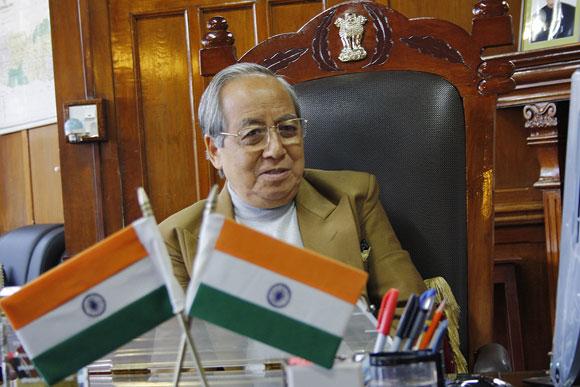
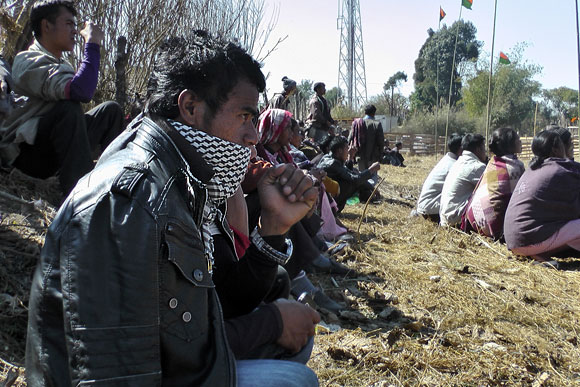
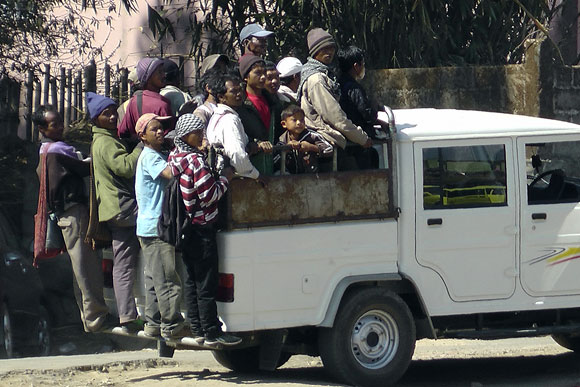
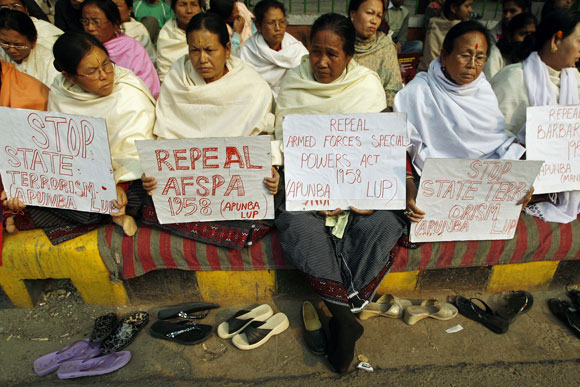
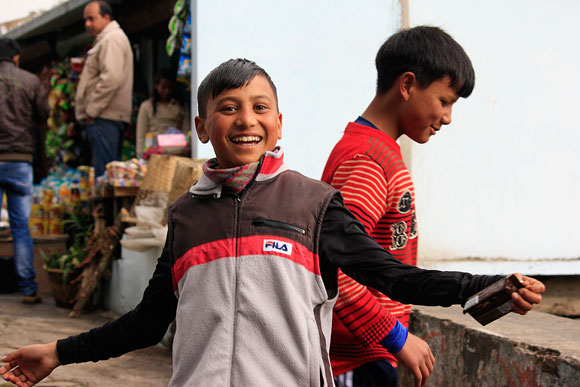
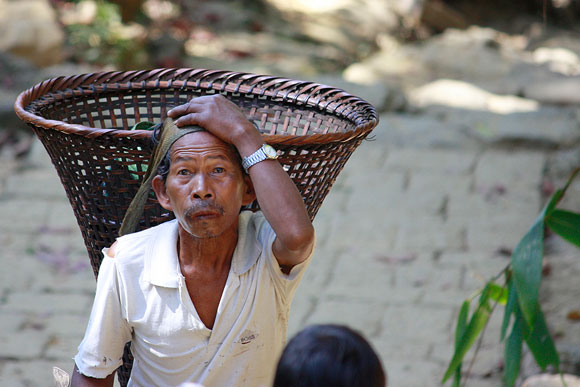
article